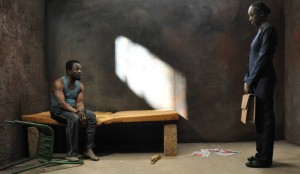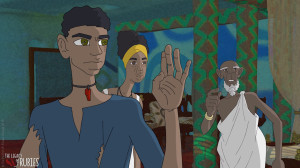
By Sharon Simonson
A history of European colonization unites Africa, India and Mexico, continents and countries that in turn are sending residents to Silicon Valley and the United States. These diaspora communities throughout the Bay Area are expressing their complex intellectual and cultural heritages — including their American experiences — in theater, dance, music, literature and film.
Growing up in Nigeria, a nation of nearly two hundred million people and a former British colony, performance was his passion from an early age, said filmmaker Chike Nwoffiah. From age 4 on, “I was in a theater and on a stage.”
In high school, he attended a Nigerian boarding school with a curriculum based on the traditional British model, studying Shakespeare, literature and the arts. “I loved it to death, and I knew it was what I really wanted to do,” he said. But performance was not considered a profession, so he studied business in preparation for work life.
When he left home for Silicon Valley and corporate U.S.A. as a young man 27 years ago, Nwoffiah was shocked by how his life experience differed so much from the common perceptions about Africa that he found.

With a billion people and 54 countries, to his mind the continent’s diversity of life was rich and full, not dominated by deprivation.“This portrayal of Africa in the Western world was so mind-boggling,” Nwoffiah said. “I felt that if one could engage to open the lens, we could change the narrative of the conversation.”
That urge plus a realization that the corporate life was not for him led him to what his heart knew best. In 1996, he co-founded Mountain View’s Oriki Theater Co. to bring African performance and culture to Silicon Valley, and then, six years ago, he created the Silicon Valley African Film Festival.
This weekend, the festival presents more than 40 feature-length and short narrative-fiction movies, documentaries and animations on two screens at the Finn Center in the Community School of Music and Arts, 230 San Antonio Circle in Mountain View. The films’ directors hail from 17 African countries including Morocco, Egypt, Uganda, Kenya, Rwanda, Zimbabwe, Tunisia, Ghana, Algeria, Nigeria, Malawi, Cameroon and Cote d’Ivoire. Ten of the filmmakers are traveling to Silicon Valley for the gathering.

More than seeking films with particular themes or high-value production, the Silicon Valley festival looks for an “authentic” perspective on African life, Nwoffiah said. With 230 films by African directors submitted for consideration this year, he is especially struck by the surge of strong submissions from women. In “Between Brackets,” a six-minute narrative film in French, Algerian director Kebaili Imene asks: “Why do I have to live my life in a box created by society?” he said.
The weekend begins with a lobby reception at 5:30 p.m. on Friday, Oct. 16, followed by an opening ceremony with a parade of flags and the introduction of filmmakers and other notable attendees including Gilles Delcourt, the deputy cultural attache for the Consulate General of France in San Francisco.
The consulate co-presents opening-night’s “Eye of the Storm,” the story of a young lawyer officially assigned to defend a rebel accused of war crimes in an unspecified African country fractured by civil war. The director, Sékou Traoré, is from Burkina Faso, a former French colony in Western Africa with an estimated 16 million people. The country has a long film tradition and is home to the Pan-African Film & Television Festival, known by its French acronym FesPACO. A French film with English subtitles, “Eye of the Storm” received three awards at FesPACO in March including best actor and best actress.
The showing is the movie’s American premiere, Nwoffiah said. The hour-and-40-minute film begins at 8 p.m.

The festival also includes the 70-minute feature documentary “e18hteam” by Zambian director Juan Rodriguez-Briso recounting the national depression and recovery that followed the 1993 plane crash off the coast of Gabon that killed Zambia’s entire national soccer team and the team’s return to win its first title at the African Cup of Nations tournament in February 2012, also in Gabon. Honorary Consul General Robert Sichinga Jr. of the Honorary General Consulate of the Republic of Zambia in Los Angeles also is expected to attend.
On Saturday at 11 a.m., the “Innovate Africa Forum” features Ghana-native Fiifi Deku, a Cisco Systems Inc. analyst who now lives in Santa Clara and is seeking to overhaul news gathering and distribution in Africa; Uzo Amaka, author of “Ages of Suffocation: Remembered Dreams,” an Oakland native and daughter of a Nigerian father and American mother who was raised in Lagos, Nigeria, from age 2 to age 12; and the four women — all black and all engineers — who created My Muse Dolls, a company that allows girls to “design” 18-inch “multicultural” dolls to resemble them. The company also makes “Feature Dolls” with their own personas including one of the first, an aspiring young engineer from Lagos, Nigeria.
Besides films, the event includes live performance and an African market. “We want to create an environment for people to hear and understand, to experience what we call the true story of the real Africa,” said the 50-year-old Nwoffiah. He expects as many as 2,000 people over the course of the weekend.